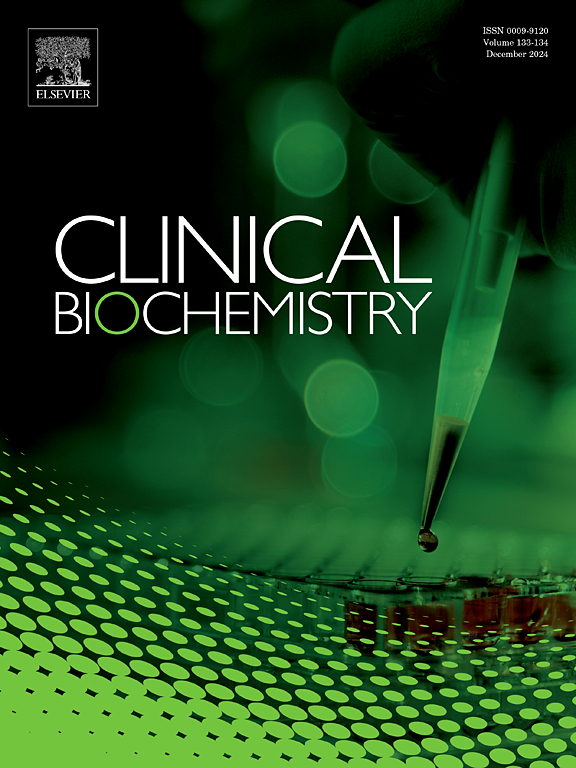DNA methylation levels are independently associated with prevalence of atherosclerotic cardiovascular disease in multifactorial chylomicronemia syndrome
IF 2.1
3区 医学
Q2 MEDICAL LABORATORY TECHNOLOGY
引用次数: 0
Abstract
Background
Multifactorial chylomicronemia syndrome (MCS) is a form of severe hypertriglyceridemia (sHTG) associated with increased risk of acute pancreatitis and atherosclerotic cardiovascular disease (ASCVD). We recently reported suggestive evidence that DNA methylation (DNAm) contribute to the sHTG phenotype in MCS. While few predictors of acute pancreatitis were previously identified in MCS, predictors of ASCVD in MCS remain mostly unknown.
Objective
To study the factors associated with previous history of ASCVD in MCS patients.
Methods
A total of 114 patients with MCS were included in this retrospective study. Prevalence of ASCVD was determined at the baseline visit and defined as any atherosclerotic event: angina, myocardial infarction, coronary angioplasty, coronary bypass surgery, claudication, peripheral angioplasty, peripheral arterial surgery, transient ischemic attack, stroke, carotid endarterectomy, and artery stenosis (>50 %). DNAm level at ABCG1 (cg06500161), CPT1A (cg00574958), and SREBF1 (cg11024682) candidate gene loci was quantified using pyrosequencing of bisulfite-treated DNA.
Results
Univariate analysis showed that age, ABCG1 and SREBF1 DNAm level, and the presence of obesity, hypertension, diabetes, and maximal TG level > 40 mmol/L were associated with previous history of ASCVD. Multivariate analysis showed that age (OR 1.11 [1.04–1.18], p = 0.0006), SREBF1 DNAm levels (OR 1.12 [1.03–1.24], p = 0.01), the presence of a maximal TG level > 40 mmol/L (OR 0.13 [0.02–0.90], p = 0.04), and obesity (OR 3.32 [1.00–11.19, p = 0.05] were independently associated with history of ASCVD and explained 44.8 % of the variability in the prevalence of ASCVD (p < 0.0001).
Conclusion
This study shows that SREBF1 DNAm levels are independently associated with prevalence of ASCVD in MCS patients. It suggests that further studies of epivariations may contribute to better understand the clinical heterogeneity seen in MCS patients.
DNA甲基化水平与多因子乳糜微粒血症综合征中动脉粥样硬化性心血管疾病的患病率独立相关
背景:多因素乳糜微粒血症综合征(MCS)是一种严重的高甘油三酯血症(sHTG),与急性胰腺炎和动脉粥样硬化性心血管疾病(ASCVD)的风险增加相关。我们最近报道了DNA甲基化(DNAm)有助于MCS中sHTG表型的启发性证据。虽然MCS中很少有急性胰腺炎的预测因素,但MCS中ASCVD的预测因素仍然未知。目的探讨MCS患者ASCVD病史的相关因素。方法回顾性分析114例MCS患者。在基线访问时确定ASCVD的患病率,并将其定义为任何动脉粥样硬化事件:心绞痛、心肌梗死、冠状动脉成形术、冠状动脉搭桥手术、跛行、外周血管成形术、外周动脉手术、短暂性脑缺血发作、中风、颈动脉内膜切除术和动脉狭窄(50%)。用焦磷酸测序法测定ABCG1 (cg06500161)、CPT1A (cg00574958)和SREBF1 (cg11024682)候选基因位点上的DNAm水平。结果单因素分析显示,年龄、ABCG1、SREBF1、DNAm水平、是否存在肥胖、高血压、糖尿病、最大TG水平与年龄、ABCG1、SREBF1、DNAm水平有关;40 mmol/L与既往ASCVD病史相关。多因素分析显示,年龄(OR为1.11 [1.04-1.18],p = 0.0006)、SREBF1 DNAm水平(OR为1.12 [1.03-1.24],p = 0.01)、是否存在最大TG水平和gt;40 mmol/L (OR 0.13 [0.02-0.90], p = 0.04)和肥胖(OR 3.32 [1.00-11.19, p = 0.05)与ASCVD病史独立相关,并解释了44.8%的ASCVD患病率变异性(p <;0.0001)。结论SREBF1 DNAm水平与MCS患者ASCVD患病率独立相关。这表明,进一步研究外变可能有助于更好地了解MCS患者的临床异质性。
本文章由计算机程序翻译,如有差异,请以英文原文为准。
求助全文
约1分钟内获得全文
求助全文
来源期刊

Clinical biochemistry
医学-医学实验技术
CiteScore
5.10
自引率
0.00%
发文量
151
审稿时长
25 days
期刊介绍:
Clinical Biochemistry publishes articles relating to clinical chemistry, molecular biology and genetics, therapeutic drug monitoring and toxicology, laboratory immunology and laboratory medicine in general, with the focus on analytical and clinical investigation of laboratory tests in humans used for diagnosis, prognosis, treatment and therapy, and monitoring of disease.
 求助内容:
求助内容: 应助结果提醒方式:
应助结果提醒方式:


